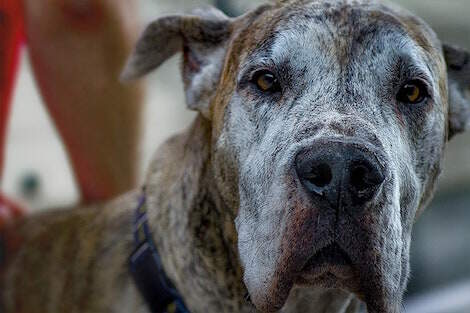
Most dog owners enjoy the companionship with their animals so much, they may not notice that the years go by quickly and their animal buddy may not be able to do the same things he did in the past. Large breeds generally have a shorter lifespans than smaller breeds and the “senior years” may creep up before you realize it. Pay attention to these 6 signs that can indicate your dog has entered his senior years, and it’s time to give him extra care.
Graying Hair
Many dogs clearly show their age with gray hair around the muzzle and face. Grayness may also show behind the ears and on random areas on the body. When this sign appears, be aware that other physical changes may also be occurring. Adjust his exercise and veterinary care accordingly.
Sudden Signs of Joint Pain
You dog may suddenly begin limping during walks or may be reluctant to romp with you either indoors or outdoors. He may yelp with pain when going quickly up the stairs or during other activities. He may have developed arthritis in his legs or hips that cause pain with boisterous movement. You may need to stop taking your dog along on runs or bike rides to prevent further damage to his joints. Scale down his walks a little to ensure that you are not adding to his discomfort. Talk to your physician about your dog’s condition. The vet may be able to suggest supplements to help with joint pain or prescribe a medication.
Eating Problems
Older dogs may have dental problems that cause them to refuse certain foods. Your veterinarian will be able to tell if the dog has broken or damaged teeth that need to be removed. Older dogs can also have diminished sense of smell and taste. They may suddenly decide their usual food is no longer tasty. To deal with faulty sense of smell or taste, try adding a little garlic or a bit of seasoning to his food. You may have to try other brands of dog food to entice him to eat. It’s important that older animals get sufficient nutrition to stay healthy and active. Discuss options with your vet. He may recommend a “senior” type of food or a vitamin supplement for your dog’s nutritional needs.
Increased Sleep Time
Your older dog may spend more time sleeping than he formerly did. You may have to rouse him to go for walks, or he may take a bit more time to wake up before greeting you at the door when you arrive at home. These are signs that his body needs more time to restore itself. Assign him a comfortable spot in the living room or bedroom, on a dog bed or soft blanket out of the way of drafts, so he can get his rest.
Internal Temperature Control
Older dogs may have more difficulty keeping their internal body temperature regulated. Your dog may need a sweater for walking in very cold winter temperatures. He may also not be able to cool himself as well in hot temperatures. Remember that dogs can only sweat through panting or through the pads of their feet. Avoid keeping him outdoors in the heat of the day. Leave the air-conditioning or a fan on for him when you leave the house during hot weather. Ensure that he has plenty of water and some shade if he is left outdoors during the summer months.
